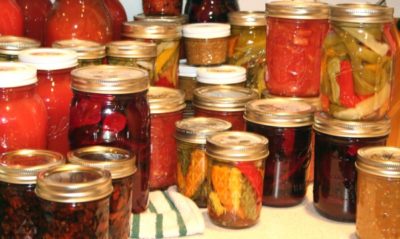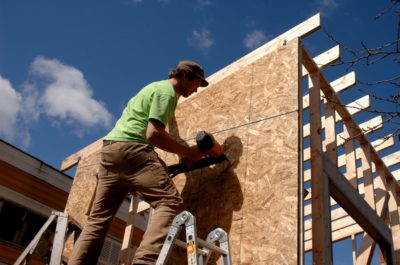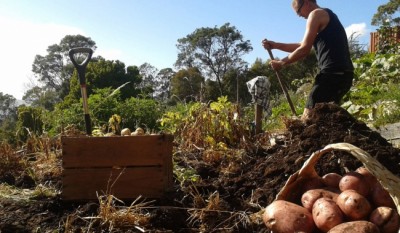We live in a society that has a well-oiled system in place to meet our various needs, be it providing the food we eat, the clothes we wear, or the house we live in. Can you imagine how helpless we would be if this support system came crashing down?
No doubt, many would find it hard to survive on their own, but knowing a few basic survival skills can make all the difference. Moreover, it will give you confidence and more freedom of choice.
Food, clothing and shelter are the three most indispensable needs of man. Our self-reliance is measurable by how well we can provide ourselves with these necessities if needed.
Do you have these seven essential skills?
1. Growing and gathering food
We don’t have to be in a survival situation to learn and use this skill. Gardening and animal husbandry can make us self-reliant to a great extent. We can grow vegetables in the limited space at our disposal, and even rear some animals that would contribute to our nutrition. Did you know that sprouting certain seeds can increase their nutritional value many times over?
The Best Source For Non-GMO Heirloom Seeds Is Right Here!
In history, gathering food from nature actually preceded cultivation, but finding edible stuff in the wild is not only difficult, but downright dangerous today. We have lost the knowhow of distinguishing the good stuff from the bad, be it wild fruits, roots or bulbs. But we can still learn to find a few reliable ones like acorns and pine nuts.
Even gathering food from what we grow is a skill to be learned. What good is a cow if we don’t know how to milk it?
2. Preparing and preserving food
 Limiting our diet to raw vegetables and fruit can be quite restrictive nutritionally – not to mention the sense of satisfaction we get out of eating.
Limiting our diet to raw vegetables and fruit can be quite restrictive nutritionally – not to mention the sense of satisfaction we get out of eating.
Food preparation involves cleaning, combining and cooking different edibles to get a balanced meal. Proteins, especially the ones from animal sources like fish and game, require cooking, and it takes a bit of practice to get it right.
Preserving excess food by fermenting, drying, pickling or making log-lasting sauces, jams and jellies used to be a mark of greater self-reliance in the food department before the supermarkets started providing all we need.
3. Making and managing a fire
Out in the wilderness, fire can offer much-needed warmth and protection from wild animals and blood sucking insects that spread diseases. It also can cook our food.
Making and maintaining a fire in a controlled manner is definitely one of the most useful skills. Self-reliance with respect to fire is not as simple as striking a match to ignite fuel-drenched wood in the fire pit. Practice in your yard so that you’ll know what to do when it’s needed.
4. Being handy with tools and weapons
Simple tools, from needles, knives and screwdrivers to heavy ones like axes and saws, can help provide for many necessities, including clothing and shelter. Weapons like bows and arrows, and daggers and guns, can be useful for self-defense and life preservation.
Good marksmanship, whether it is with a gun or a simple sling, is a great asset in a wilderness survival situation. But in today’s world, it is not that difficult to imagine situations when this skill may protect you in an urban setting.
5. Constructing a shelter or building
Being able to fashion a temporary shelter out of found materials could save your life, especially when it’s cold. But more elaborate and lasting structures need some real carpentry and masonry skills.
The Secrets Of Sea Minerals To Grow More “Nutritionally-Dense Food” Than You Can Possibly Eat!
Knowing how to lay bricks, mix concrete, build strong, straight walls to support a roof, etc., can help you in everyday life, be it building a garden shed or a chicken coop. If you have the requisite skills, you can always find suitable materials to substitute for what’s lacking. For example, sun-dried mud blocks can take the place of bricks and mud paste to hold them together like cement.
 Woodworking skills also can make you equally self-reliant, besides providing an immensely enjoyable and productive hobby. Sawing wood, chiseling and joining it to form the structural elements of the house or pieces of furniture, takes knowledge, experience and precision.
Woodworking skills also can make you equally self-reliant, besides providing an immensely enjoyable and productive hobby. Sawing wood, chiseling and joining it to form the structural elements of the house or pieces of furniture, takes knowledge, experience and precision.
6. Operating and maintaining simple machinery
A working knowledge of everyday mechanics should be on everybody’s priority list. Any device that makes life easy can be counted as a machine, whether it is operated manually, electrically or electronically. One cannot be an expert of everything, but a minimum amount of mechanical skills can go a long way.
Besides learning to operate machines of everyday use such as a lawnmower, a bit of trouble shooting and repair skills to maintain them would can benefit the self-reliant person, who may be an hour’s drive from the nearest store. Things like tightening a nut here or changing a spark plug there will give you confidence to tackle more serious issues over time.
7. Finding your way around
There’s nothing like a thorough knowledge of directions and a good sense of one’s own bearings when it comes to finding our way around in any situation. But you need to develop a number of different skills and strategies, depending on where you find yourself.
In a city or town with well-laid-out roads, the ability to read maps and road signs may help you get from place to place. But in a less-controlled situation, whether on land or water, self-reliance with regard to navigation depends on our ability to find directions from the cues nature provides.
Besides the position of the sun during the day and the stars at night, knowing a few facts like which side of the tree moss grows or which direction the wind blows in a particular season can be invaluable. A good sense of orientation gives us unlimited freedom of movement.
Many of these self-reliance skills can be developed further by practicing them when they are actually needed, but knowing the basics ahead of time gives you extra leverage, and a solid foundation to build upon.
What self-reliant skills would you add to this list? Share your suggestions in the section below:
What’s The Biggest Mistake Gardeners Will Make This Year? Find Out Here.
 Off The Grid News Better Ideas For Off The Grid Living
Off The Grid News Better Ideas For Off The Grid Living





